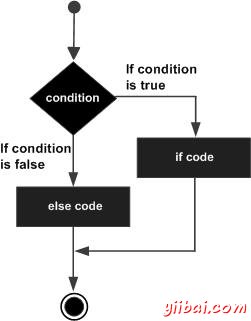C語言if else語句
if語句可以跟著一個可選的else語句,當else執行時,布爾表達式為false。
語法
在C編程語言中的if ... else語句的語法是:
if(boolean_expression) { /* statement(s) will execute if the boolean expression is true */ } else { /* statement(s) will execute if the boolean expression is false */ }
如果布爾表達式的值為true,那麼 if 代碼塊將被執行,否則 else 代碼塊將被執行。
C語言編程假定任何非零和非空值作為true,如果是零或null,則假定為false。
流程圖:

例子:
#include <stdio.h> int main () { /* local variable definition */ int a = 100; /* check the boolean condition */ if( a < 20 ) { /* if condition is true then print the following */ printf("a is less than 20 " ); } else { /* if condition is false then print the following */ printf("a is not less than 20 " ); } printf("value of a is : %d ", a); return 0; }
讓我們編譯和運行上麵的程序,這將產生以下結果:
a is not less than 20; value of a is : 100
if...else if...else 語句
if語句可以跟著一個可選的else if ... else語句,這是非常有用的使用單if語句測試if...else if 語句的各種條件。
當使用 if , else if , else語句有幾點要記住:
-
一個 if 可以有零或一個else,它必須跟從else if之後(如果有else if)。
-
一個 if 可以有零到多個else if, 並且它們必須在else之前。
-
一旦一個else if成功,任何剩餘else if或else將不會被測試。
語法
if...else if...else語句在C編程語言的語法是:
if(boolean_expression 1) { /* Executes when the boolean expression 1 is true */ } else if( boolean_expression 2) { /* Executes when the boolean expression 2 is true */ } else if( boolean_expression 3) { /* Executes when the boolean expression 3 is true */ } else { /* executes when the none of the above condition is true */ }
例子:
#include <stdio.h> int main () { /* local variable definition */ int a = 100; /* check the boolean condition */ if( a == 10 ) { /* if condition is true then print the following */ printf("Value of a is 10 " ); } else if( a == 20 ) { /* if else if condition is true */ printf("Value of a is 20 " ); } else if( a == 30 ) { /* if else if condition is true */ printf("Value of a is 30 " ); } else { /* if none of the conditions is true */ printf("None of the values is matching " ); } printf("Exact value of a is: %d ", a ); return 0; }
讓我們編譯和運行上麵的程序,這將產生以下結果:
None of the values is matching Exact value of a is: 100


